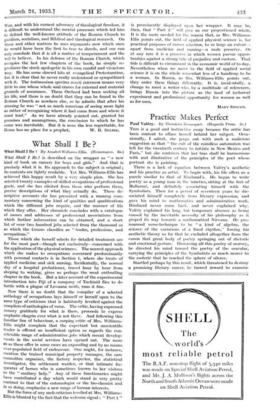What Shall I Be?
What Shall I Be By Amabel Williams-Ellis. (Heinemann. 6s.)
What Shall I Be? is described on the wrapper as "a new kind of book on careers for boys and girls." And that is precisely what it is. Its approach to the subject is original ; its contents are lightly readable. Yet Mrs. Williams-Ellis has achieved this happy result by a very simple plan. She has selected twenty examples of skilled occupations of professional grade, and she has elicited from those who perform them, precise descriptions of what they actually do. These de- scriptive accounts she has presented with a running com- mentary concerning the kind of qualities and qualifications which the different jobs require, and the manner of life which they offer. Her chronicle concludes with a catalogue of names and addresses of professional associations from which further information can be obtained, and a short list of over two hundred jobs selected from the thousand or so which the Census classifies as "trades, professions, and occupations."
Those which she herself selects for detailed treatment are for the most part—though not exclusively—concerned with the application of the physical sciences. The nearest approach which she makes to occupations concerned predominantly with personal contacts is in Section 1, where she treats of applied medicine and sick nursing. Incidentally, the normal day of a hospital probationer, traced hour by hour from sleeping to waking, gives us perhaps the most enthralling chapter in the book. But a later account of the experimental introduction into Fiji of a company of Tachinid flies to do battle with a plague of Levuana moth, runs it fine.
Now there is no doubt that the compiler of a selected anthology of occupations lays himself or herself open to the same type of criticism that is habitually levelled against the compilers of anthologies of verse. The critic, having expressed cursory gratitude for what is there, proceeds to express emphatic chagrin over what is not there. And following this familiar line of behaviour, a carping critic of Mrs. Williams- Ellis might complain that the expectant but unscientific reader is offered an insufficient option as regards the con- siderable range of administrative jobs which recent develop- ments in the social services have opened out. The more so as these offer in some cases an expanding and by no means over-populated field of endeavour. One might, for instance, mention the trained municipal property manager, the care committee organizer, the factory inspector, the statistical investigator, the settlement warden, or that intimate fre- quenter of homes who is sometimes known to her visitees as the "sanitary lady." Any of these functionaries might have contributed a day which would stand in very pretty contrast to that of the entomologist or the bio-chemist and in so doing, emphasize a new range of human interests.
But the force of any such criticism levelled at Mrs. Williams- Ellis is blunted by the fact that the welcome signal : "Part 1" is prominently displayed upon her wrapper. It may be, then, that "Part 2" will give us our proportioned whole. It is the more needed for the reason that, as Mrs. Williams- Ellis points out, the field of applied physical science is, for practical purposes of career selection, to so large an extent— apart from medicine and nursing—a male preserve. Or at any rate it is a preserve in which women pursue oppor- tunities against a strong tide of prejudice and custom. That tide is difficult to circumvent in the economic world of to-day. Nevertheless when we move to the field of applied social science it is on the whole somewhat less of a handicap to be • a woman. In Russia, as Mrs. Williams-Ellis points out, they order these things differently. It is, incidentally, a change to meet a writer who, by a multitude of references, brings Russia into the picture as the land of technical experiment and professional opportunity for women as well as for men.
MARY STOCKS.






































 Previous page
Previous page